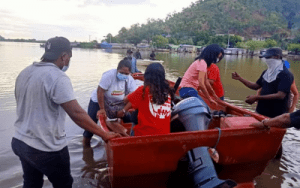 Nearly two months after the devastating Easter Sunday floods, Timor Leste is in the process of assessing damage, rebuilding and responding to the humanitarian crisis while also trying to control the spread of COVID-19.
Nearly two months after the devastating Easter Sunday floods, Timor Leste is in the process of assessing damage, rebuilding and responding to the humanitarian crisis while also trying to control the spread of COVID-19.
COVID-19: controlling the spread
While COVID-19 cases are still dangerously high (over 150 new cases recorded per day and 15 deaths), the spread of COVID-19 to the districts has reduced. This means that there are now only three districts of Timor (Dili, Bacau and Suai) still in lockdown. In addition, vaccines have arrived in Timor Leste with more than 63,000 first doses already administered, primarily to front line workers. One of the biggest challenges in controlling the virus is a widespread reluctance to get tested (for fear of a positive result and inability to earn any income) and vaccinated (through fears of complications spread via negative media reports).
Responding to the floods
APHEDA’s partner organisations have been responding to the humanitarian crisis caused by the Easter Sunday floods through offering direct support to families and communities most severely affected by the disaster. They have been working to assess the immediate and short-term needs of target groups including domestic workers, farmers and workers across Dili and throughout the districts.
Following an assessment led by the KSTL (the peak union body of Timor Leste), over 650 union members from across multiple industry groups were assessed as being high risk and in need of urgent humanitarian support. A proposal by APHEDA partner organisation, SJT-TL, will direct funds raise through APHEDA’s Timor Leste appeal to providing basic food items for the most vulnerable.
The impact on livelihoods, food and nutrition
Livelihoods have been affected in significant ways both in the cities (where lockdowns have made it impossible for many people to travel to work and hundreds of businesses have closed down) and in the districts (where whole crops, stored seeds and harvested produce were destroyed across multiple locations). In locations where farmers are still able to harvest food, the capacity to sell their produce (and provide an income to the families) has been dramatically reduced with road closures and COVID travel restrictions bringing the local economies to almost a complete standstill. Currently most farming areas have reasonable food security, but the inability to get fresh produce to the towns and city centres means that the most vulnerable people lack access to essential nutrition.
Community-led solutions
APHEDA’s Timor Country Manager, Elisabeth Lino de Araujo, and APHEDA partner organisations KSI, IEP, UNAER, WWCTL and SJT-TL are monitoring the conditions and needs of their member bases on a daily basis. Through the support of generous donations from Australian union members, they are able to respond immediately and provide basic and urgent assistance. Planning is underway with each partner organisation for medium-term activities to address the ongoing impacts of the double crisis and to generate community-led solutions.
Help Rebuild Livelihoods in Timor Leste
Catastrophic Flooding in Timor Leste over the 2021 Easter Weekend left the capital city of Dili and many rural areas inundated including the total destruction of homes, roads and bridges.
By contributing today, you will help APHEDA’s Timor Leste partner organisations:
- Play their roles in recovering from the impact of both the COVID and flood disasters.
- Ensure project partner organisations are equipped with the resources they need to support members impacted by the crisis.
- Sustain their successful movement-building and organising among workers, women and farmers.
- Practical assistance to restore livelihoods impacted by the double crisis.
- Strengthen rights for Timorese workers, women and farmers to collectively organise.